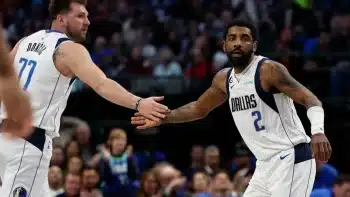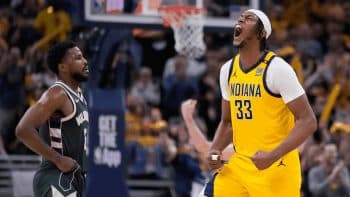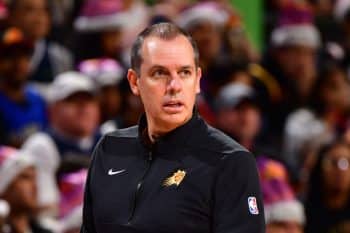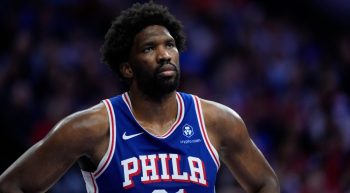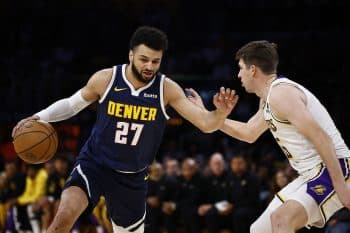NBA
NBA Daily: Grading The Offseason – Utah Jazz
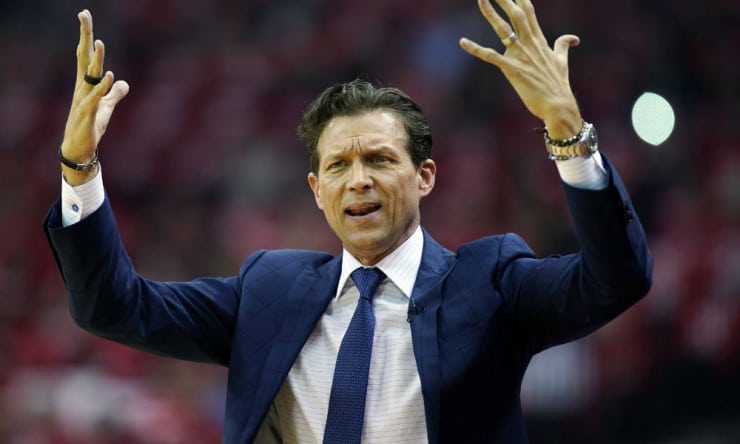
Another milestone during the dog days of NBA summer has come and gone. The schedule was released on Monday and to no one’s surprise, the Los Angeles Lakers lead the way with 43 nationally televised contests. Equally as unsurprising is the fact that Charlotte and Cleveland round at the bottom at a measly three games per franchise.
You didn’t click on this link to learn about the rankings of nationally televised NBA games per team, so we will turn around now and dive into the highly-productive offseason of the Utah Jazz.
But before we start, the Jazz have 25 nationally televised games – good for 10th in the league.
Overview
The Jazz had about a good a season as they could have hoped for in 2017-18. Their franchise cornerstone – Gordon Hayward – left them for Title Town over the summer before that season kicked off. Most – if not all – assumed that the Jazz were headed towards a sub .500 season. Insert Donovan Mitchell.
Utah tears their way to a five seed, defeats the Oklahoma City Thunder in the first round in just six games, then endures a gentleman’s sweep from the far superior Houston Rockets. They 100 percent exceeded expectations.
Dennis Lindsay – the GM at the time – decided to stand pat during the offseason. Sure, if a blockbuster move would have shown up he may have taken it. But he rolled with chemistry, hoping that it would be enough to push the Jazz even further in 2018-19.
It’s not that he was wrong, he just wasn’t…right. Utah had great chemistry last season, but that still didn’t make them an elite team. They had a top-3 defense, a slightly-above-average offense and a highly-intuitive coaching staff. Those are all characteristics of a good playoff team. They are not all characteristics of a championship team.
They ended with another five seed and were more-or-less unlucky enough to face Houston round one in the playoffs. After another gentleman’s sweep, the FO knew that changes needed to be made.
Offseason
Lindsay got promoted to VP of Basketball Operations and Utah was able to promote the highly-sought-after Justin Zanik to general manager. Working as a tandem, they made their first major splash before the free agency period opened up by trading for Mike Conley. The trade included their 2019 first-round pick, as well as a future first-rounder, and they had to give up Grayson Allen, Kyle Korver and Jae Crowder.
That was an incredibly small price to pay for the kind of production they will be able to get with Conley on the floor accompanied by budding star Donovan Mitchell.
Mitchell, contrary to popular belief, actually improved on his rookie campaign. His numbers were higher, his efficiency didn’t drop and he was asked to take on an even bigger amount of the workload. The fact of the matter is – there were long periods of time that Mitchell was asked to shoulder *all* of the offensive burden. This made it all too easy for teams to set up productive defensive schemes in stopping Mitchell.
Conley’s presence alone will allow Mitchell’s game to open up a lot more. But Conley won’t simply be standing on the court. He has incredible court vision. He’s more than capable of creating his own shot, and likely better at providing open looks for his teammates.
Up next was the draft. Utah didn’t own a first-round pick as theirs was sent to Memphis via the Conley trade. The organization ended the night with three draft selections in the late-second round, one of them being their own, and two they got via trade from Indiana and Golden State.
They got Jarrell Brantley from the College of Charleston, Justin Wright-Foreman from Hofstra and Miye Oni from Yale. All three players would end up making the roster for Utah, Oni as a full-time member and Brantley and Wright-Foreman as two-way players.
It was reported that Utah was going to be active once the free agency period opened on July 1, but it’s likely no one knew just how active they’d be.
The marquee signing was Bojan Bogdanovic. He instantly becomes the third-best offensive option that Utah has, and having a player of his caliber as your third choice is definitely a plus. They replaced their loss of Derrick Favors with Ed Davis, a similar style player for a significantly smaller amount of money. They bolstered their bench even more with the signings of Jeff Green and Emmanuel Mudiay. Both players signing one-year deals at the veteran’s minimum is what most economists would refer to as “low risk with potentially high reward.”
Losing Jae Crowder, Derrick Favors and even Ricky Rubio will feel strange next season, as all three of those players have played major roles for the Jazz the past two seasons. But the number of upgrades the Jazz added offensively more than makeup for what they’ll be losing defensively. And it’s not like the Jazz are losing their defensive identity. Conley is a better defender than Rubio. Bojan is more than serviceable on that end, and Ed Davis will provide at a minimum 80 percent of what Favors offered on D, if not more.
Utah added a few more players to round out their roster, they are all detailed below.
PLAYERS IN: Mike Conley, Bojan Bogdanovic, Jeff Green, Emmanuel Mudiay, Ed Davis, Miye Oni, Nigel Williams-Goss, Stanton Kidd, William Howard, Jarrell Brantley (two-way), Justin Wright-Foreman (two-way)
PLAYERS OUT: Ricky Rubio, Derrick Favors, Jae Crowder, Kyle Korver, Grayson Allen, Raul Neto, Ekpe Udoh, Thabo Sefolosha, Tyler Cavanaugh (two-way), Naz Mitrou-Long (two-way)
What’s Next
First things first, Utah needs to figure out its rotation. The team lost starting point guard Ricky Rubio to free agency and had to trade away starting power forward Derrick Favors to bring in Bogdanovic. Jae Crowder, a major part of their rotation and usually a guy that was part of their closing lineup, was sent to Memphis as part of the Conley deal.
The most popular idea would be to have Conley and Mitchell at the guard positions, Bojan at the three, Jeff Green at the four and Gobert at the five. This would allow Joe Ingles to come off the bench, lead the second unit, then move to the four to close out games alongside the remaining starters.
Ed Davis will likely play the five exclusively as second-year player Georges Niang will play backup minutes at the four. Dante Exum and Royce O’Neal will play major minutes as backup guards with Mudiay slotted to fill in should any injuries occur.
That rounds out their likely nine-man (10 counting Mudiay) rotation. The closing lineup with Bojan at the three and Ingles at the four makes the most sense, so it will be interesting to see how Utah decides to employ their starting five. They certainly have the versatility to mix things up should a specific matchup call for it.
Utah’s biggest weakness last season, at least in the playoffs, was its inability to make open shots. The Jazz shot an abysmal 26.3 percent from three against Houston in round one, but that’s not even the bad part. They were 23.6 percent on shots considered wide-open – when the defender was six-plus feet away.
It was clear their main focus of the offseason was to upgrade their three-point shooting. Signing Conley and Bogdanovic did so in a huge way.
Bojan shot 40 percent from three two seasons ago and was 42.5 percent this past season. He’s even deadlier from the corner. Conley isn’t an elite three-point shooter, but he’s absolutely considered efficient from range and will be a pretty big upgrade to Rubio in that skillset. Teams will have to respect his presence on the floor which will help Mitchell and Gobert in the pick and roll; defenders can’t just suck into the paint as they did before.
Utah will need to reassert itself as a defensive force after losing a few critical role players on that end, but the presence of the reigning, two-time Defensive Player of the Year Rudy Gobert will likely make it a simple and powerful assertion. There is a lot to like about Utah’s offseason, they did about as good as anyone could have imagined, and they will 100 percent be a force when it comes to the playoffs.
Interested betting on the Utah team? – Don’t miss out on reading our guide about sports betting in Utah first!
It isn’t a foregone conclusion, not by a longshot, but there’s a chance Utah has three players on this upcoming season’s Western Conference All-Star team.
OFFSEASON GRADE: A-
